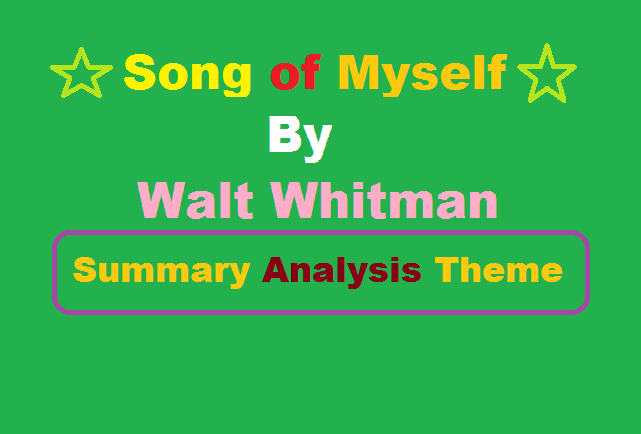Song of Myself by Walt Whitman, is a wonderful poem. Today i am going to discuss about the main theme, summary and analysis of the poem Song of Myself
Table Of Contents
Song of Myself Analysis and Summary
The different sections of the poem “Song of Myself” are pregnant with meaning. Whitman observes life and presents it in the poem. He is the poet of self. Though it seems to us that soul, self and body are three different identical words but Whitman, like a mystic tries to unite these three into oneness which is immortal.
Read More: Character of Belinda in Rape of the Lock
Whitman’s self is organized with his soul and body. And his soul and body are not the two different things. He says that “the soul is not more than body”. He also says that “the body is not more than soul”.
Important Theme of Song of Myself
There are three important themes or main speech in poem “Song of Myself”. One is the idea of the self and the other is the identification of self with other selves and the very last one is individual self’s journey towards universal and Divine self.
The Whitman the self is both individual and universal. There is an excellent relation between his self and divine. The poet talks himself and “the soul”. While talking himself, he is taking of all human beings.
The soul of the poet is in quest of the divine. He discovers himself with the others. He considers himself one with the others. The universe becomes the self. While singing of himself, he sings of the whole mankind. At the time of singing of whole mankind. He praises the maker of universe. He says in the following ways in the poem:
“Of every hue and caste am I, of every rank and religion
A farmer mechanic, artist, gentlemen, sailor, Quaker
Prisoner, fancy-man, rowdy, lawyer, physician priest”
His self rises to cosmic dimension. According to Whitman, the self of man should combine with the divine. The self shows itself in the universe Whitman’s self is inclusive of all. His self includes people of all type class every status and every religion. All are equal irrespective of castle, color, sex and religion of democracy. His self is not only linked to any one place on the earth but also it belongs to the sky to the earth.
It belongs to the earth to the universe. It is a companion of all people. It is not bound by life and death. It is open. It includes everything in the universe. The consciousness of self leads to the understanding of the soul. The poet sings of the body the physical and of the soul of spiritual. Indeed Walt Whitman preached a pantheistic democracy. He says:
“I give the sign of democracy”
“Song of myself” is not just the poet’s self-observation, but it is an observation of himself as a man and an American. Whitman tries to establish a relationship with God through the soul. God is present everywhere in every object and every form in the universe.
Here Whitman is similar to William Wordsworth. The basic idea of the poem is unity, off all creation, both living and non living. The poem studies the mankind. The poet sings for all humanity. He always concerned the equal identity of the human beings.
Whitman sings about the life everyday Americans. As a democratic poet he says in the following ways:
“I celebrate myself and sing myself
And what I assume, you shall assume
For every atom belonging to me as good belongs to you”
We see the poet loafs on the grass and invites his soul to appear. According to Whitman a leaf of grass is no less than the journey. He says in the following way in the poem:
“I believe a leaf of grass is no les than the journey work of the stars”
The poet sees himself in others. He declares that whatever belongs to others is to be found in his self. So the poem has a wide ranging universal theme. At the time of talking of himself, the poet huge all selves. There is an autobiographical touch in this poem. The poet sings to himself and observes the whole humanity in that self.
Truly speaking, Whitman as a democratic and national poet of America does not believe in body rather he believes in soul, not in heaven but in hell because he says in the poem:
“I am the poet of the body and I am the poet of soul
The pleasure of heaven are with me and pains hells are with me”
Song of Myself by Walt Whitman. Summary and analysis
You may watch the video about Song of Myself by Walt Whitman. Summary and analysis in the following for your better understanding.
Read More Literary Writings:
To His Coy Mistress Analysis And Summary By Andrew Marvell
Somebody Once Told Me The World Was Macaroni Lyrics
The Love Song of J. Alfred Prufrock represents conflict of modern man
Robert Browning as a writer of dramatic monologue
Tennyson as a representative poet of his age or Victorian Period



